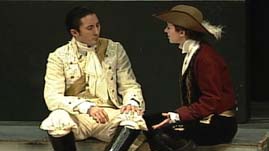Teachers' Domain - Digital Media for the Classroom and Professional Development
User: Preview



John Basil, founding member of the American Globe Theatre in New York City, directed graduate students from Penn State's School of Theatre in this production of selected scenes from William Shakespeare's Twelfth Night during Penn State's 2007 theatre season.
Jennifer Evans, Josie Gildow, and Gary Masquelier, English teachers from central Pennsylvania, wrote lesson plans based on these video segments.

In this video from Penn State's School of Theatre production of Twelfth Night, back at his palace, Orsino summons Feste to perform a song. In the meantime, the Duke and Viola have a conversation about a certain someone Viola (Cesario) fancies, and Orsino offers his love advice. Orsino declares he will not take “no” for an answer from Olivia, but Viola protests that love doesn’t always go according to plan. The two debate men’s and women’s capacities for love, and at the end of their exchange, Orsino orders Viola (Cesario) to return to Olivia with a love token from him.
The action shifts back to Orsino and Viola (or Cesario). Orsino’s romantic and frivolous ideas about love and attraction find voice in this scene as he and Viola discuss falling in love with women. ‘Cesario’ lets slip out that ‘he’ has his heart set on a someone and Orsino offers his love advice. He seems to place a great deal of importance on a man’s lady love being younger than him in order for him to sustain his attraction toward her. This piece of advice speaks volumes about Orsino’s idea of love. Ironically, but in keeping with his vanity, he thinks of himself as an ideal lover and advises Cesario to follow his example. As the scene continues, Orsino’s self-absorption becomes painfully clear through Shakespeare’s use of dramatic irony as Viola professes her love for him and he totally misses her advances. (She is, in Orsino’s defense, dressed as a male the entire time!)
Orsino and Cesario argue about how well men and women can love. Orsino is of the opinion that men are better lovers than women, which is not surprising since the Petrarchan lover thinks of himself as a worshipper supreme of his lady love and likely cannot think of a reversal of positions. Cesario (being in reality a woman) strongly disagrees with this belief and attempts to convince Orsino of the contrary.
Feste, the clown, sings a song upon Orsino’s command: "Come away death." The gist of the song is that unrequited love will lead to death. This is absurd. Plus, this is a rather melancholy song for such a light-hearted comedy. But Feste, through this song, is deliberately fueling Orsino’s distorted and unrealistic delusions about romantic love. Orsino perversely enjoys the heartache he suffers through his unrequited love for Olivia; Feste, on the other hand, receives generous payment from Orsino for his artful singing of this song. The motivations and the actions of these two characters in this scene begs the question, “Who of the two is truly the fool: Feste who skillfully earns a living through his art or Orsino who enjoys wallowing in unrequited love and self-pity?” Orsino is clearly impressed by the song because he says:
. . . it did relieve my passion much,
More than light airs and recollected terms
Of those most brisk and giddy-paced times. (Act II, Sc. 4, Lines 4-6)
(Lines 15-20)
Come hither, boy. If ever thou shalt love,
In the sweet pangs of it remember me;
For such as I am all true lovers are,
Unstaid and skittish in all motions else
Save in the constant image of the creature
That is beloved.
What do these lines tell us about Orsino’s character and his attitude toward love?
Lines 23-41 Orsino's conversation with Viola
Then let thy love be younger than thyself,
Or thy affection cannot hold the bent; / For women
are as roses, whose fair flow’r,
Being once displayed, doth fall that very hour.
What is Orsino saying? What does this advice demonstrate about his character and his values?
(Lines 51-66)—Feste’s song, “Come Away Death”
What does this melancholy song have to do with the play? Why include it here?
(Lines 73-78)
Now the melancholy god protect thee, and the tailor make thy doublet of changeable taffeta, for thy mind is a very opal. I would have men of such constancy put to sea, that their business might be everything, and their intent everywhere; for that’s it that always makes a good voyage of nothing.
Feste often speaks in riddles, yet his words hold deep significance. What do you make of these parting words to Orsino?
(Lines 81-119)—Orsino’s conversation with Viola about men’s and women’s hearts
What does Orsino believe about men’s and women’s capacity for love? Does Viola’s disguise allow her to say things (in defense of women) that a woman would not typically be able to say?
 Loading Standards
Loading Standards